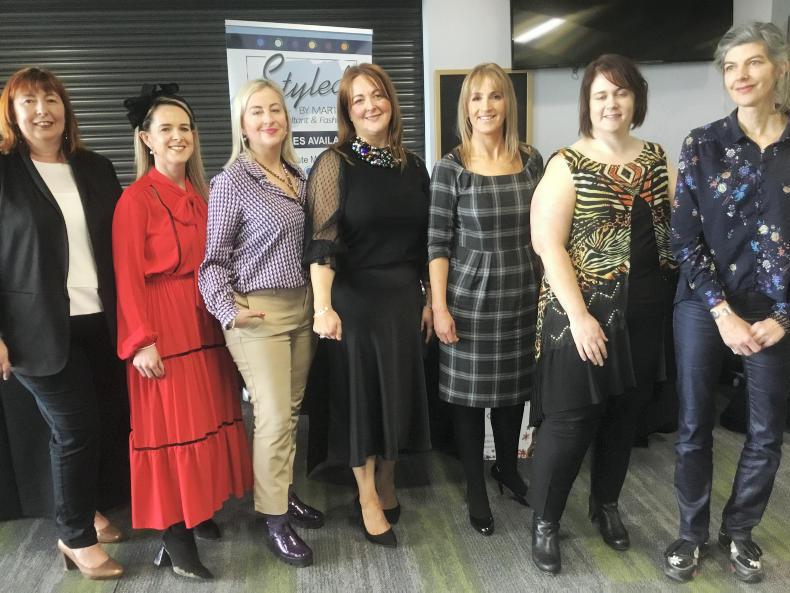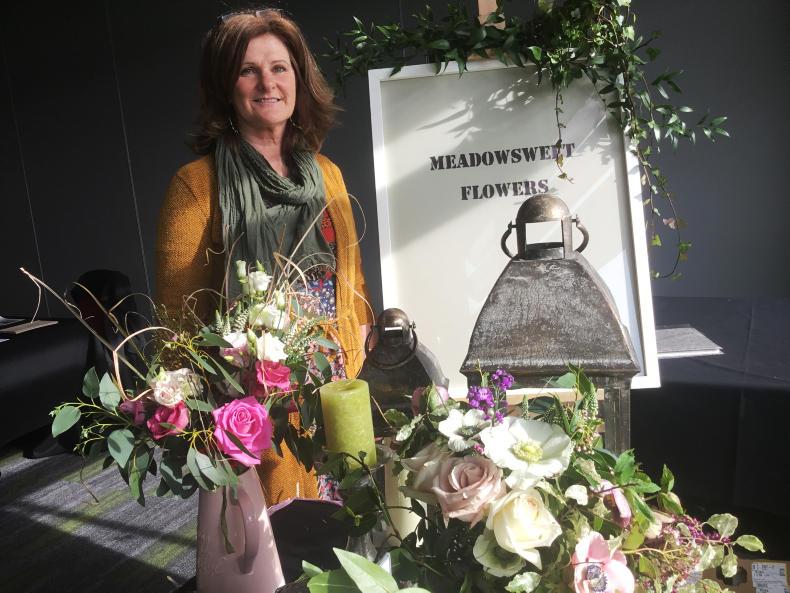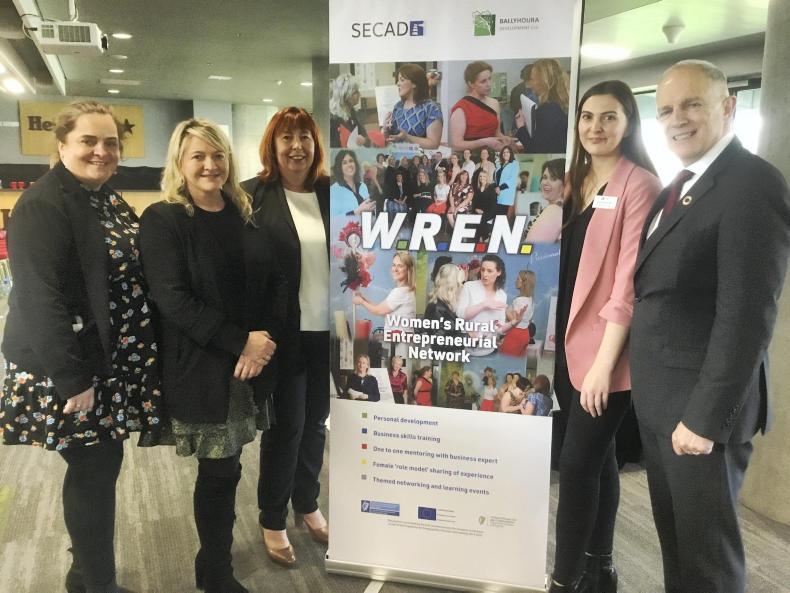There was a great buzz of chat in one of the big conference rooms in Páirc Uí Chaoimh last Monday as over 120 like-minded women gathered to celebrate and showcase 20 new businesses. These businesses had gotten off the ground with the support of the Women’s Rural Entrepreneurial Network programme, better known as WREN.
The newly minted entrepreneurs were just a sample of the 77 rural women who had completed the WREN programme, which was funded by the EU Social Fund to set up their own business.
Their new businesses range from book publishing to bakeries, pottery, wedding supplies, millenary, floristry, technical support, holistic supports, nutrition, poultry equipment and sales
Suzanne Kearney is assistant CEO of South East Cork Area Development company (SECAD) which, along with Limerick-based Ballyhoura Development CLG, came together to address the lack of female entrepreneurship in rural areas.
“It’s well documented how few women make it into senior management roles or run their own businesses in rural areas. By coming together we created a regional focus on the issue and secured €300,000 of EU Social Fund money to do the work.”
In all, 77 rural women from Cork, Clare and Limerick took part in the programme. Their new businesses range from book publishing to bakeries, pottery, wedding supplies, millenary, floristry, technical support, holistic supports, nutrition, poultry equipment and sales. And lots more.
“We ran the programme four times over the two and a half years with anything up to 19 women on each course. Most of those women are still in touch with us and their businesses are doing well. Each one is different so some are managing their business while still in full-time employment. Some have gone part time so as to have some income security until the business takes off. Others have gone in at the deep end and are working full time in their new business.”

Frances Doyle, programme co-ordinator South East Cork Area Development; Elaine O’Sullivan of Panama and Pearl; Ellen Martin of Wedding Belles; Martina Leahy of Styled by Martina; Miriam Montague, co-ordinator; Karen Casey of Mobile Device Management; and Isabelle O’Driscoll of UCC.
Solicitor Clare Jones developed Lough Gur Pottery while on the course. “I had serious imposter syndrome at the start, so hearing other women voice the same concerns was really supportive. Goal setting, time management, confidence building and public speaking were important parts of the course. When the course finished I had developed a business plan and a website. I had my branding in place and I’d bought a bigger kiln.”
Women advised to stop saying: ‘I’m just a...’
Frances Doyle works with SECAD and is one of two co-ordinators of the programme. Her advice to budding female entrepreneurs is simple. “Don’t wait until you can tick all the boxes. It will never happen if you do.”
Rearing children – it’s hugely important work and should be recognised as such
She says women need to stop saying: “No, I’m just a... housewife, rearing the children.” The other descriptor she wants women to stop using is: “No, I’m only... working at home/part time.”
“These are confidence killers and women need to stop describing their life this way. Rearing children – it’s hugely important work and should be recognised as such.
“But we find that a lack of self-confidence is the biggest barrier facing women who want to establish their own business. Therefore building that confidence is a major part of the course.”

Dorothea Gail, Cocoon Press Mallow; Clair Jones, Lough Gur Pottery, Bruff; Siobhan Clifford, Geography Tours Ireland Cratloe, Ciara Shorley, development officer with Ballyhoura Development, Eileen O’Keeffe, programme co-ordinator with Ballyhoura Development.
Eileen O’Keeffe is co-ordinator for the Ballyhoura side of the programme and she agrees with Frances. “Women are still under-represented in senior management and leadership roles. Skills are being wasted because women are stereotyped.
“Many of our participants had been caring for family. Other were in full-time employment. They were all looking for a flexible way of making an income, one that fits around family life.”
Initial research on 32 participants shows an age range of 25-67, with an average age of 42. Half of the sample were in caring roles either for family or relatives who were ill.
Call out for percipients
During the programme the participants took modules in personal development, business training, mentoring and in developing a business plan.
In the process, they clocked up 20 academic credits from Cork Institute of Technology. They were advised to build on this with lifelong learning.
Both Ballyhoura and SECAD are calling for participants in the next programme which begins in April.
This time around it is planned to complete a level 1 programme as before and to add a level 2 programme. This will offer more advanced business training along with networking skills and personal development.
They will also have an online platform which will offer more flexibility in delivering content to participants.
If you have a good business idea and want to test its limits then the WREN programme could be just what you need. Contact Frances at www.secad.ie or Eileen at www.ballyhouradevelopment.com for more.
Hobbies combine to make a business

Fiona Liston of Meadowsweet Flowers, Croom, Co Limerick, completed the WREN programme.
Fiona Liston is a flower farmer and florist from Croom, Co Limerick. The family were in dairying but now produce organic beef. When the children were reared, Fiona decided to go to art college in Limerick where she studied painting and fine art. She followed this with a FETAC course in horticulture at the organic centre in Drumcollogher.
“Initially, I had no plan to start a business. I loved gardening and after the horticulture course I had the skills to increase my output and that got me thinking. I went on to do a floristry course which was part-funded by the National Organic Training Skillnet programme.”
Then everything Fiona had studied came together when she was selected to participate in the 2019 WREN programme.
“I was confident in my floristry and gardening skills, the programme sharpened my business skills. It forced me to set goals, plan a strategy and network with other women who were on the same path. We all faced the same struggles and their support was wonderful.”
Now with Meadowsweet Flowers up and running, Fiona is delighted with how things have worked out. “I specialise in styling for weddings and I have regular contracts to supply some restaurants in Adare with floral arrangements every week. I also do bespoke events.”
Fiona’s floral style is for a natural look inspired by nature. From April to October and even into November 60% of the foliage and flowers used by Fiona are grown on her farm.
Even at this time of year she can produce home-grown viburnum, hellebores, heathers, scented Daphne and pittosporum, not to mention snowdrops and daffodils.
“I always loved gardening and painting and now by combining both and with the support of WREN it’s a business I really enjoy.”
Six tips for new businesses
1 Stay connected – it’s essential for businesses.
2 Get a mentor.
3 Meet up with other entrepreneurs. LinkedIn will help.
4 Continue your education.
5 Use the many supports that are there to help new businesses.
6 If it’s not working out, talk to someone. Be brave and review your plan.
Source: Paul Healy of Rubicon Consultants who delivered part of the WREN programme
Read more
Women coming together
Women in Touch
There was a great buzz of chat in one of the big conference rooms in Páirc Uí Chaoimh last Monday as over 120 like-minded women gathered to celebrate and showcase 20 new businesses. These businesses had gotten off the ground with the support of the Women’s Rural Entrepreneurial Network programme, better known as WREN.
The newly minted entrepreneurs were just a sample of the 77 rural women who had completed the WREN programme, which was funded by the EU Social Fund to set up their own business.
Their new businesses range from book publishing to bakeries, pottery, wedding supplies, millenary, floristry, technical support, holistic supports, nutrition, poultry equipment and sales
Suzanne Kearney is assistant CEO of South East Cork Area Development company (SECAD) which, along with Limerick-based Ballyhoura Development CLG, came together to address the lack of female entrepreneurship in rural areas.
“It’s well documented how few women make it into senior management roles or run their own businesses in rural areas. By coming together we created a regional focus on the issue and secured €300,000 of EU Social Fund money to do the work.”
In all, 77 rural women from Cork, Clare and Limerick took part in the programme. Their new businesses range from book publishing to bakeries, pottery, wedding supplies, millenary, floristry, technical support, holistic supports, nutrition, poultry equipment and sales. And lots more.
“We ran the programme four times over the two and a half years with anything up to 19 women on each course. Most of those women are still in touch with us and their businesses are doing well. Each one is different so some are managing their business while still in full-time employment. Some have gone part time so as to have some income security until the business takes off. Others have gone in at the deep end and are working full time in their new business.”

Frances Doyle, programme co-ordinator South East Cork Area Development; Elaine O’Sullivan of Panama and Pearl; Ellen Martin of Wedding Belles; Martina Leahy of Styled by Martina; Miriam Montague, co-ordinator; Karen Casey of Mobile Device Management; and Isabelle O’Driscoll of UCC.
Solicitor Clare Jones developed Lough Gur Pottery while on the course. “I had serious imposter syndrome at the start, so hearing other women voice the same concerns was really supportive. Goal setting, time management, confidence building and public speaking were important parts of the course. When the course finished I had developed a business plan and a website. I had my branding in place and I’d bought a bigger kiln.”
Women advised to stop saying: ‘I’m just a...’
Frances Doyle works with SECAD and is one of two co-ordinators of the programme. Her advice to budding female entrepreneurs is simple. “Don’t wait until you can tick all the boxes. It will never happen if you do.”
Rearing children – it’s hugely important work and should be recognised as such
She says women need to stop saying: “No, I’m just a... housewife, rearing the children.” The other descriptor she wants women to stop using is: “No, I’m only... working at home/part time.”
“These are confidence killers and women need to stop describing their life this way. Rearing children – it’s hugely important work and should be recognised as such.
“But we find that a lack of self-confidence is the biggest barrier facing women who want to establish their own business. Therefore building that confidence is a major part of the course.”

Dorothea Gail, Cocoon Press Mallow; Clair Jones, Lough Gur Pottery, Bruff; Siobhan Clifford, Geography Tours Ireland Cratloe, Ciara Shorley, development officer with Ballyhoura Development, Eileen O’Keeffe, programme co-ordinator with Ballyhoura Development.
Eileen O’Keeffe is co-ordinator for the Ballyhoura side of the programme and she agrees with Frances. “Women are still under-represented in senior management and leadership roles. Skills are being wasted because women are stereotyped.
“Many of our participants had been caring for family. Other were in full-time employment. They were all looking for a flexible way of making an income, one that fits around family life.”
Initial research on 32 participants shows an age range of 25-67, with an average age of 42. Half of the sample were in caring roles either for family or relatives who were ill.
Call out for percipients
During the programme the participants took modules in personal development, business training, mentoring and in developing a business plan.
In the process, they clocked up 20 academic credits from Cork Institute of Technology. They were advised to build on this with lifelong learning.
Both Ballyhoura and SECAD are calling for participants in the next programme which begins in April.
This time around it is planned to complete a level 1 programme as before and to add a level 2 programme. This will offer more advanced business training along with networking skills and personal development.
They will also have an online platform which will offer more flexibility in delivering content to participants.
If you have a good business idea and want to test its limits then the WREN programme could be just what you need. Contact Frances at www.secad.ie or Eileen at www.ballyhouradevelopment.com for more.
Hobbies combine to make a business

Fiona Liston of Meadowsweet Flowers, Croom, Co Limerick, completed the WREN programme.
Fiona Liston is a flower farmer and florist from Croom, Co Limerick. The family were in dairying but now produce organic beef. When the children were reared, Fiona decided to go to art college in Limerick where she studied painting and fine art. She followed this with a FETAC course in horticulture at the organic centre in Drumcollogher.
“Initially, I had no plan to start a business. I loved gardening and after the horticulture course I had the skills to increase my output and that got me thinking. I went on to do a floristry course which was part-funded by the National Organic Training Skillnet programme.”
Then everything Fiona had studied came together when she was selected to participate in the 2019 WREN programme.
“I was confident in my floristry and gardening skills, the programme sharpened my business skills. It forced me to set goals, plan a strategy and network with other women who were on the same path. We all faced the same struggles and their support was wonderful.”
Now with Meadowsweet Flowers up and running, Fiona is delighted with how things have worked out. “I specialise in styling for weddings and I have regular contracts to supply some restaurants in Adare with floral arrangements every week. I also do bespoke events.”
Fiona’s floral style is for a natural look inspired by nature. From April to October and even into November 60% of the foliage and flowers used by Fiona are grown on her farm.
Even at this time of year she can produce home-grown viburnum, hellebores, heathers, scented Daphne and pittosporum, not to mention snowdrops and daffodils.
“I always loved gardening and painting and now by combining both and with the support of WREN it’s a business I really enjoy.”
Six tips for new businesses
1 Stay connected – it’s essential for businesses.
2 Get a mentor.
3 Meet up with other entrepreneurs. LinkedIn will help.
4 Continue your education.
5 Use the many supports that are there to help new businesses.
6 If it’s not working out, talk to someone. Be brave and review your plan.
Source: Paul Healy of Rubicon Consultants who delivered part of the WREN programme
Read more
Women coming together
Women in Touch









 This is a subscriber-only article
This is a subscriber-only article









SHARING OPTIONS: